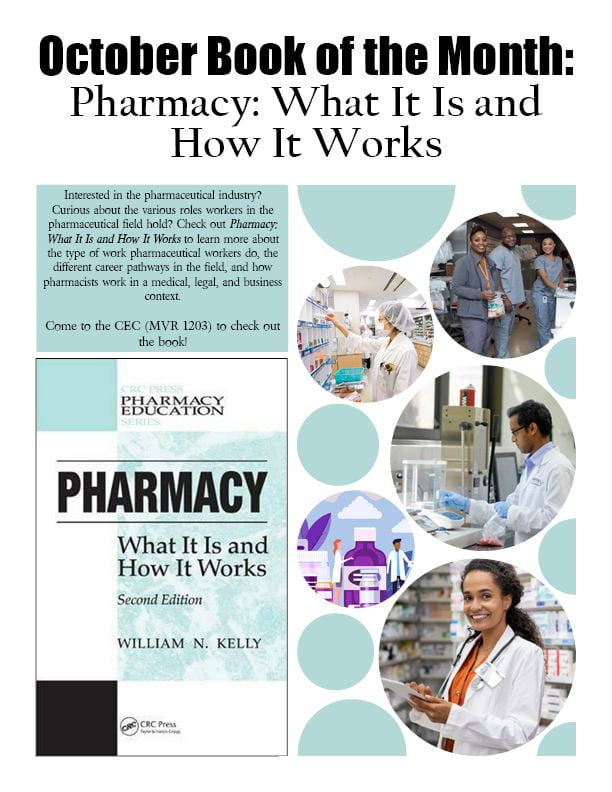To celebrate American Pharmacists Month, we will be reading Pharmacy: What It Is and How It Works for our October Book of the Month. With so many of our undergraduates following the pre-med track, it is often difficult for other pre-health students to find helpful information and opportunities related to their career paths. This month, we will be highlighting pathways in the pharmaceutical industry, exploring the wide variety of career titles in this vastly diverse field.
When thinking of a pharmacist’s main role, many imagine individuals in lab coats handling prescriptions and providing medications for various healthcare conditions. However, individuals in the pharmaceutical industry hold many roles, including but not limited to:
- Medication quality controller: Ensuring that the medications they give patients are the most appropriate and efficient for their conditions. In a hospital or clinical setting, the chief pharmacist acts as a quality controller by confirming that their drug-use process is legal and follows all government regulations.
- Caregiver: Pharmacists have to communicate with patients to explain the purpose of their medication, instructions for taking the medication, potential side effects. In addition to these jobs, pharmacists also need to show compassion and support for the patients.
- Clinical pharmacist: Rather than providing patients with medications, clinical pharmacists usually work with patients and their physicians to determine the best medication and dosage, as well as studying side effects and proper usage of the medication. Therefore, clinical pharmacists need proper knowledge of the more chemical and biological aspects of pharmacy.
- Teacher: Many pharmacists go on to teach pharmacy students, technicians, and nurses.
- Business pharmacists: Many pharmacists follow a more business path in their careers. Whether it is managing finances in healthcare clinics or hospitals, or working in human resources, pharmacists can continue advancing and becoming managers of companies—even their own. To fully advance in this field, some pharmacists earn a masters of business administration.
- Researcher: Pharmacists can enter academia or continue researching medications through scientific research—clinical drug research, laboratory, and animal studies. Many of these pharmacists hold advanced education degrees including Ph.D., M.A., and Pharm.D.
In addition to several other roles that pharmacists can hold, this book goes into detail on career planning for pharmacists, supply and demand in the workforce, basic information on medical drugs, pharmacists in relation to the U.S. healthcare system, information on pharmaceutical care, pharmaceutical technology and automation, and much more.
If you are interested in the pharmaceutical industry, come over to the Career Exploration Center at MVR 1203 during our open hours to read or check out Pharmacy: What It Is and How It Works for more information!
